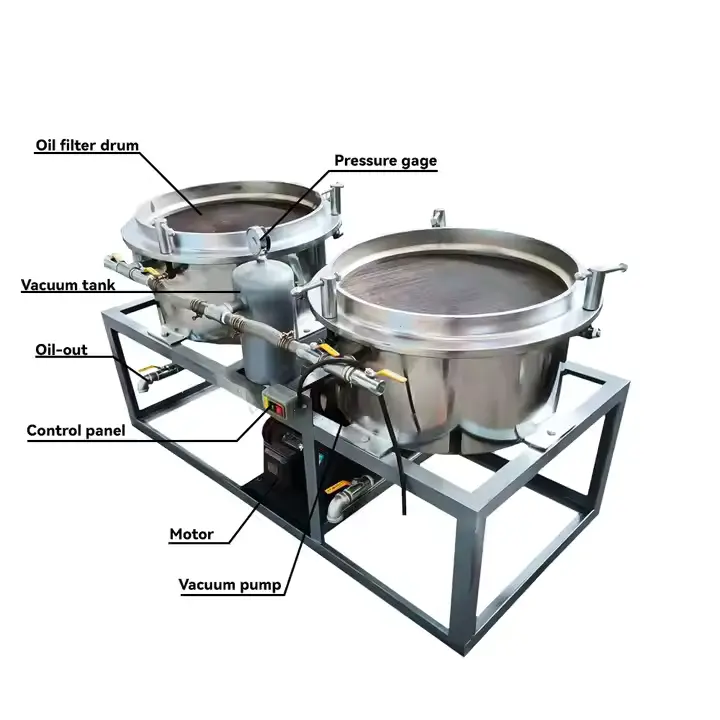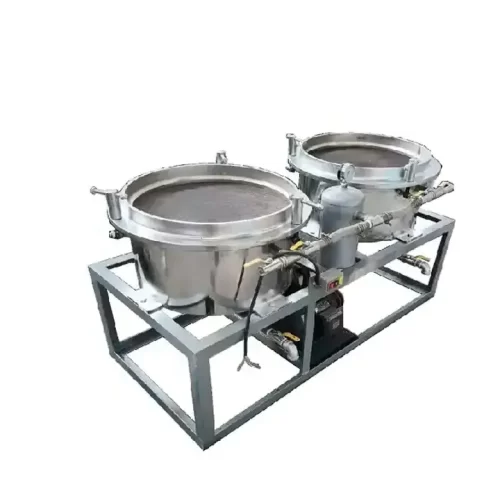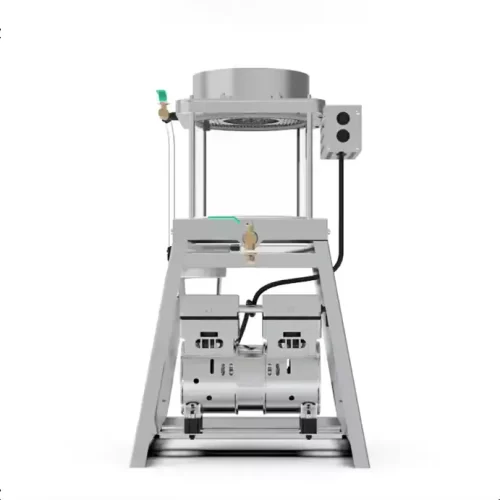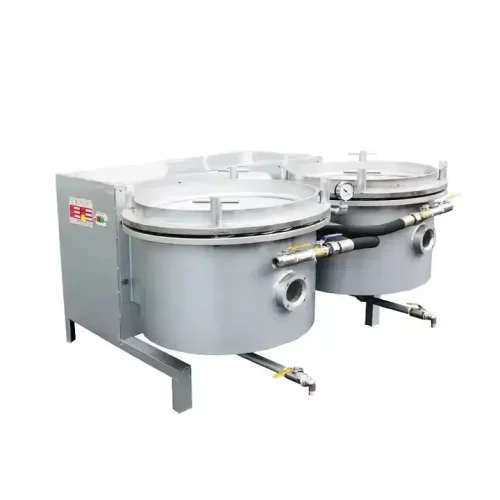Contact Us Now
Vacuum Oil Filter
Edible Oil Vacuum Oil Filter Machine Manufacturer
The vacuum oil filter combines gentle heat and vacuum pressure to remove excess water, impurities and odors from the first pressed oil, improving the clarity and shelf life of the oil. GQ-Agri specializes in compact and reliable vacuum edible oil filters for small oil mills. Improve the quality of oil and get more repeat customers.
Continuous filtration reduces downtime
For crop edible oil processors competing in the local market, visible impurities or moisture usually means lower prices and dissatisfied buyers. The vacuum oil filter solves this pain point and achieves higher oil purity through negative pressure filtration. Remove moisture, odors, and residual plant fibers in one go without affecting taste. Its user-friendly design supports continuous operation with less manual intervention, leaving you time for other things.
Using a professional vacuum oil filter can increase the market appeal of the final vegetable oil while simplifying maintenance and controlling costs.
As a supplier of small oil mills with more than 15 years of experience, GQ-Agri provides global agricultural practitioners with stable and reliable oil filtration equipment with rich expertise to meet the production needs of edible oil in different regions.

How Does a Vacuum Oil Filter Machine Work?
The edible oil filter is usually used in conjunction with the oil press. After the crude oil is squeezed out of the oil press, it still contains fine suspended solids, plant fibers and moisture. The vacuum oil filter uses a vacuum pump to extract the air in the oil storage tank, and after forming a vacuum negative pressure, the oil is sucked into the vacuum barrel through the filter cloth. Therefore, it is sometimes called a vacuum pump edible oil filter.
The basic operating principle is as follows:
- Oil inlet: Crude oil flows from the oil press into the oil pan on the upper layer of the vacuum oil filter tank, and the oil pan is pre-laid with filter cloth or filter paper.
- Negative pressure filtration: Under the action of vacuum, the oil is sucked into the fine filter cloth or filter plate. The negative pressure forces the oil to pass through the multi-layer filter medium of the filter cloth quickly and evenly, leaving solid particles. Clean oil is fed into the vacuum chamber and a constant vacuum environment is maintained by a vacuum pump.
- Dehumidification: After the vegetable oil enters the vacuum state, the dissolved water in the oil can be removed, further improving its clarity and shelf life.
- Filtered oil collection: The purified oil is then collected in a separate container for bottling, storage or further refining.
The overall process can be summarized as: Crude oil in → Vacuum pump creates negative pressure → Filtration → Clean oil out.
Key Advantages of Using a Vacuum Oil Filter for Edible Oil Production.
For small edible oil processors and farm oil mills, it is important to understand the actual advantages of different vegetable oil filters (such as vacuum oil filters, centrifugal oil filters, and plate and frame oil filters) when comparing them. Let me tell you what makes vacuum oil filters different.
- Compared with centrifugal oil filters, vacuum filtration has a better impurity removal effect and does not require the calculation of brine mixing ratios. The filter cloth of the vacuum oil filter can effectively capture fine solids and sediments from plant fibers, resulting in clear, high-quality oil.
- The vacuum environment helps to reduce residual moisture in the oil. This directly extends the shelf life of the oil, delays the rancidity of the oil, and improves the storage stability of the edible oil during sales.
- The mechanical stress level of vacuum filtration is lower than that of high-speed centrifugal oil filters. The filtering process creates less foam, less oxidation, and better preserves the oil’s natural color and nutrients.
- The vacuum oil filter can work continuously, which not only improves production efficiency, but also saves labor costs, which is especially valuable for small personal oil mills with limited manpower.
- Compared with some large industrial plate and frame oil filters, vacuum oil filters are relatively compact, easy to move and simple to maintain.
- One vacuum filter can handle multiple oilseed types – peanuts, sunflowers, sesame, rapeseed, palm kernels, etc. This means that there is no need to prepare multiple dedicated oil filters, helping small businesses save costs.
With the improvement of quality of life, consumers expect safer, clearer and longer-lasting cooking oil. Filtered oil and unfiltered oil directly determine whether you can gain a good market reputation.
Technical Specifications & Model Options.
One of our customers in northern Indonesia runs a small peanut oil mill that supplies fresh cooking oil to several surrounding villages and towns. Before investing in a vacuum oil filter, they said customers often complained about cloudy oil, short shelf life, and visible sediment at the bottom of the bottle. Now, with the integration of our vacuum oil filter, they are able to produce clearer, higher quality cooking oil. It can be stored longer even in hot and humid conditions and sold at a higher price. This seemingly simple upgrade has made a huge difference in their daily business.
When choosing a vacuum oil filter for your edible oil production, there are some practical points to consider. Here are some key factors we always advise our customers to consider before making a decision:
- Processing capacity:How much oil do you plan to filter per day or hour? Choosing the right filter’s model according to the output of the oil press can avoid production bottlenecks.
- Oil Type Compatibility:Local crops are always diverse and it is impossible for us to filter only one type of vegetable oil. Some crop oils contain more fine particles or water.
- Filtration accuracy:Any consumer has expectations for cooking oil quality. A quality vacuum filter removes fine solids and water for clear, safe, and longer-lasting cooking oil.
- Cost-effectiveness:Besides the upfront price, consider long-term operating costs, such as energy consumption, filter cloth replacement costs, and ease of maintenance. A vacuum oil filter that takes both price and cost into consideration can help you save money.
- Durability and build quality:In rural or high-humidity environments, a sturdy structure and high-quality seals can increase vacuum filter life.
- Space and mobility:Is your oil pressing business based in a fixed location or does it move from village to village? The compact mobile oil filter fits on a vehicle, while the stationary vacuum oil filter produces oil faster.
By considering these points, we can clearly understand which vacuum oil filter model is best suited for current business needs. Upgrade your old unit now for better plant oil quality.
Heck out the specs below for our best-selling models. Still unsure? Our team is ready to help you choose the right vacuum filter to protect your oil quality and maximize your profits.
| Oil Mill Batch Processing Model | Small Portable | ||
|---|---|---|---|
| Model | YW-single | YW-double | YJL-16 |
| Capacity (kg/hour) | 50-75 | 100-150 | 15–20 kg/h |
| Motor Power (kw) | 1.1 | 1.1 | 1.05 |
*The above are only the most popular standard models at present, and more vacuum oil filter models will be available in the future. Please contact us if you need customized specifications.
How to Maintain and Operate a Vacuum Oil Filter Machine Safely?
Configuring a vacuum oil filter for your crop oil press is the first step to producing clean, pure edible oil. Proper operation and maintenance are very important to protect our investment and ensure that daily oil filtering goes smoothly.
Basic installation requirements.
Before you start, make sure that the vacuum oil filter is installed close to the oil press. The surrounding area is clean, flat and well ventilated to minimize the oil transfer time from the oil press tray to the vacuum oil filter. For power supply, make sure that the local voltage and frequency match the specifications of the motor & vacuum pump (for example, 220V/380V, 50Hz/60Hz). It is strongly recommended that a stable backup power supply be properly configured to protect the vacuum pump in rural areas where power is unstable.
Operation Process.
Following the basic steps below, even a novice can operate the vacuum oil filter very simply and safely:
- Pour the raw edible oil into the oil pan on the vacuum bucket.
- Start the vacuum pump, open the vacuum suction valve, close the air inlet valve, and establish negative pressure in the filter tank.
- The vacuum system will suck the oil through the filter layer and the oil will enter the bottom oil tank, where impurities are blocked by the filter cloth surface.
- Keep a close eye on the oil flow and pressure gauge. Make sure the filter cloth is not blocked and the oil is filtering smoothly (often use a scraper to gently stir the grease).
- After the oil is filtered, close the vacuum suction valve and open the air inlet valve to release the pressure.
- Collect the purified oil in a clean tank or container ready for bottling.
Daily Care and Routine Maintenance.
Regular maintenance is the key to keeping the vacuum oil filter running efficiently and avoiding unnecessary downtime or additional costs. Let me tell you some practical practices:
- Regularly replace the filter cloth or filter paper: Depending on the type of crop raw material and oil production, the filter cloth needs to be cleaned or replaced every 1000KG of crude oil filtered (or when the machine is closed at night) to maintain optimal filtration cleanliness.
- Check the vacuum pump: Check the oil level and seals of the vacuum pump regularly. If the vacuum pump oil is contaminated, replace the oil – this helps ensure stable negative pressure capacity and prolong the life of the pump.
- Check seals and valves: Keep all rubber seals, gaskets and valves in good condition to avoid leaks that reduce filtration efficiency.
- Keep the oil tank clean: Empty and clean the filter oil tank regularly to prevent old residues from contaminating new oil batches.
As long as the vacuum oil filter is properly maintained, all farm oil mills can ensure that every drop of oil produced meets the clarity and safety standards expected by surrounding residents, adding more value to your oil business.
If you plan to set up your own farm oil mill, we can provide step-by-step user guides, video tutorials or online technical support to help you confidently set up a vegetable oil mill in your local area.
Why Choose GQ-Agri Vacuum Oil Filter Machine?
When it comes to investing in a vacuum oil filter machine, one thing every small oil mill owner or rural oil producer quickly realizes is this: not all filters are created equal—and neither are the suppliers behind them.
Cheap, poorly sealed vacuum filters often lose negative pressure, which means you get only half the filtration clarity you paid for—and edible oil might still turn cloudy within days.
At GQ-Agri, we’ve seen this happen to too many first-time oil filter buyers who assume all vacuum oil filters are equally reliable. So, why do hundreds of small oil producers from Southeast Asia to Africa choose our GQ-Agri vacuum oil filter machines?
The entire filter barrel is made of food-grade stainless steel, with multiple layers of filters and a reinforced vacuum seal. Our lab tests show that effective impurity removal can increase oil clarity by 25–35% compared to basic single-stage filters.
You are not just buying a machine, you’re buying packaging, spare parts support, voltage customization, and all the small details that keep your production running.
For small workshops, that extra boost in clarity and shelf life means less spoilage, fewer customer complaints, and higher local market prices. Some of our users have told us their filtered oil stays fresh 30–50% longer during storage, which is real extra profit in your pocket.
When we design each unit, we imagine it sitting in a small farm’s oil room or loaded onto a mobile oil pressing trailer. We strive to make each oil filter the best fit for specific needs.
What is the maximum filtration capacity of your vacuum oil filter?
The processing capacity of conventional oil mill vacuum oil filter models is between 50-150KG/H. We can also customize the specifications to meet your local production as needed.
Which types of oil seeds can be processed with a vacuum oil filter?
Our vacuum oil filter machines can filter a variety of crop oils:
- Oil seeds: sunflower seeds, rapeseed, sesame, soybean, castor seeds, flax seeds, tung seeds, mustard seeds, cotton seeds, etc.
- Nuts: peanuts, palm kernels, walnuts, almonds, pine nuts, macadamia nuts, Brazil nuts, etc.
- Others: olives, avocados, rice bran, corn germ, moringa, etc.
It can remove impurities from most cold-pressed or hot-pressed edible oils.
How long does it take to replace the filter cloth/filter paper?
This depends on your oil type and raw materials. The average life of the filter cloth is 1-3 months. For crude oil with high mud content, we recommend checking it every 2-4 weeks and replacing it if necessary. It needs to be removed and cleaned every day.
Can the vacuum oil filter be combined with an oil press as a complete line?
Yes. Our vacuum oil filter works perfectly with the screw oil press to form a complete edible oil production line. For novices who are planning to set up an oil press, we also provide an all-in-one oil press with a vacuum filter, which is more convenient.
Do you provide OEM or customized services?
Yes, we provide complete OEM customization services. Whether you need a custom model to fit into your existing daily production or want to be a local agent, we can make it happen.
How pure is the filtered oil compared to other filtering methods?
Vacuum oil filters are simpler and faster to operate than ordinary plate and frame oil filters, and can effectively block more water than most centrifugal oil filters. It is suitable for small edible oil producers who are looking for a balance between quality and efficiency.
Is the edible oil vacuum oil filter easy to install and operate?
Yes. This machine is compact and easy to install. We provide an English manual and can shoot an instructional video if necessary. Even if you are new to oil processing, we can help you get started immediately.
What warranty services are provided for the machine?
Our machines are durable and made of high-grade materials and motors. We provide a one-year warranty in the case of non-human damage. If it is indeed a manufacturing defect, we will return or exchange it for free.
How long is the delivery cycle after purchase?
Normally, we will ship within 3-5 working days after receiving your payment. Customized products will be estimated and notified to the customer based on actual conditions – please contact us for details.
Ready to upgrade your vegetable oil quality?
Let our experts help you choose the right oil filter for your business
Income generation guide
Income generation guide
Useful resources
Useful resources
After-sales guarantee
1-Year long warranty
Increase income
Increase agricultural income by 40%
Professional and reliable
15+ years of professional experience
Comprehensive testing
More than 30 tropical environment tests




